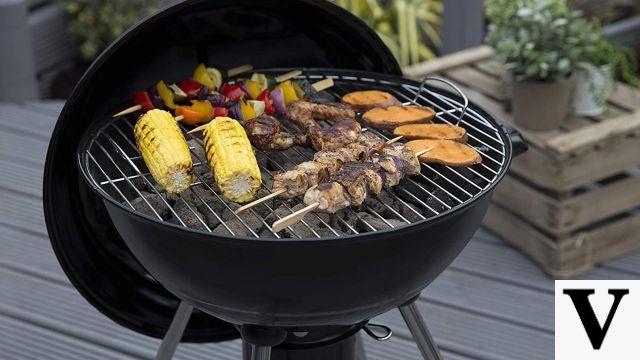
by Francesca Soccorsi
Grilled meat, fish and vegetables are a summer must. With an average cost of € 275, we in the village are the ones who invest the most in Europe to buy the dream barbecue. However, if not done correctly, grilling can involve risks (such as burns and hormonal imbalances). With the help of Professor Luciano Atzori, biologist expert in food safety and health protection, we tell you what precautions to take to make sure good dishes, but also super healthy.
AVOID LONG COOKING
A potential danger of the barbecue is constituted by the "Maillard reaction":" The sugars present in foods react with amino acids and produce compounds that give foods their typical dark color. During this process, substances with mutagenic and carcinogenic activity such as acrylamide are also formed. Furthermore, due to the high temperatures reached on the grill, foods rich in lipids and proteins, such as meat or cheese, release polycyclic aromatic hydrocarbons, considered endocrine disruptors (because they upset the balance of our hormones) and heterocyclic amines ( from oncogenic power). Many of these compounds can be absorbed either by eating or by breathing (if you are close to the embers), ”notes Atzori. How to reduce the risks? By shortening cooking times: "The more a food is cooked, and perhaps charred, the higher the content of toxic substances", explains the biologist. So, you have to limit food exposure to heat as much as possible and, if the outer surface is charred, remove it. «In the case of cuts of meat with a rather high thickness which, if they remain on the grill for less time, would risk remaining raw inside, carry out a“ pre-cooking ”of a few minutes in the microwave or in the traditional oven». Finally, put foods on the barbecue that require more or less the same number of minutes to be ready: if you prepare thinly sliced courgettes and a Florentine steak together, the chance of burning the vegetables is high, unless you are a long time be careful and don't take them off before you ruin everything.
KEEP THE GRILL CLEAN
Carefully remove the charred residues of the previous cooking: «This way you will avoid that the old toxic deposits stick to the food. In addition, if the grill is clean, you will limit the risk of noxious fumes being emitted », recommends Atzori. To turn the food on the barbecue, do not use the fork: you could inadvertently "poke" them and cause liquids to escape which would generate sudden flames. Prefer a scoop or pliers - you'll lessen the chances of charring everything.
BEWARE OF FOODS THAT ARE TOO COLD
«Don't cook food you've just taken out of the refrigerator or, even worse, from the freezer. The reason? Their surface burns immediately and you end up consuming foods that are still raw inside and which, moreover, are rich in toxic molecules on the outside, ”warns Professor Atzori. Distance from the heat source is also important to avoid carbonization. «The ideal would be to have a barbecue with the possibility of indirect cooking which, among other things, is equipped with special trays for collecting the fat. What are they for? They ensure that the lipids, by melting, do not end up on the embers, stoking the fire ».
DON'T FORGET THE MARINATION
Before stepping on the barbecue, cook meat and fish for a couple of hours. «Prepare an emulsion with oil and spices, to which, depending on your taste, add lemon juice, white or red wine, beer, vinegar or yogurt, and let the food soak. In addition to making foods more tender, "soaking" limits the production of harmful aromatic hydrocarbons », explains the biologist. Be careful, however, to drain everything well before placing it on the grill.
PREFER LEAN MEAT
When grilling meat, opt for i lean cuts, for example of chicken, turkey and rabbit: «The meats rich in lipids, such as some parts of pork or beef, in contact with the hot grill cause a lot of fats to leak. These, falling on charcoal or wood, favor the formation of carcinogenic compounds », says the expert. For the same reason, do not wet food with wine or beer once it is already on the flame.
DON'T EXCEED THE POTATOES
Vegetables also look great on the barbecue, but require some precautions: "Don't cook potatoes too often, because the typical browning that makes them very tasty is the result of the “Maillard reaction,” so the risk is to take on many harmful compounds », says Atzori. In choosing the vegetables, then, prefer the purple ones: «Aubergines and some varieties of onions are ideal on the grill, because this cooking technique increases the antioxidant activity of the naturally present polyphenols».
THE RIGHT WOOD FOR EVERY FOOD
Charcoal sold in bags at specialty stores is very practical. But if you prefer to use wood logs, focus on fruit trees: «Apple, peach, apricot, cherry and pear produce delicate essences suitable for cooking fish, vegetables, chicken and pork. Oak gives off strong aromas that go well with beef. The vine is ideal for lamb: it gives it fruity flavors, but it should be combined with other types of plants because it produces a lot of smoke that can cover the flavor. No, however, to wood obtained from conifers, such as pines, firs and cypresses: it can generate toxic substances due to the abundance of resins ", explains the expert. It also avoids resorting to recycled boards, remedied by old furniture or fruit and vegetable boxes: «They are often treated with chemicals such as fungicides, adhesives, water repellents and paints. Finally, even for the trigger, give up on do-it-yourself: pieces of rubber, fabrics or makeshift sticks can be toxic ».


























